Today’s portion is one verse-paragraph, lines 27-83, moving from Milton’s request ‘Say first…what cause’ – to the centre of the action, with Satan and the fallen angels about to begin their parley in Hell. Milton plans to tell a huge story, encompassing the beginning and end of all things, the entire universe and all its key events…and he’s going to do it with Big Poetry. Listen to the language!
Say first, for Heav'n hides nothing from thy view
Nor the deep Tract of Hell, say first what cause
Mov'd our Grand Parents in that happy State,
Favour'd of Heav'n so highly, to fall off [ 30 ]
From thir Creator, and transgress his Will
For one restraint, Lords of the World besides?
Who first seduc'd them to that foul revolt?
Th' infernal Serpent; he it was, whose guile
Stird up with Envy and Revenge, deceiv'd [ 35 ]
The Mother of Mankind, what time his Pride
Had cast him out from Heav'n, with all his Host
Of Rebel Angels, by whose aid aspiring
To set himself in Glory above his Peers,
He trusted to have equal'd the most High, [ 40 ]
If he oppos'd; and with ambitious aim
Against the Throne and Monarchy of God
Rais'd impious War in Heav'n and Battel proud
With vain attempt. Him the Almighty Power
Hurld headlong flaming from th' Ethereal Skie [ 45 ]
With hideous ruine and combustion down
To bottomless perdition, there to dwell
In Adamantine Chains and penal Fire,
Who durst defie th' Omnipotent to Arms.
Nine times the Space that measures Day and Night [ 50 ]
To mortal men, he with his horrid crew
Lay vanquisht, rowling in the fiery Gulfe
Confounded though immortal: But his doom
Reserv'd him to more wrath; for now the thought
Both of lost happiness and lasting pain [ 55 ]
Torments him; round he throws his baleful eyes
That witness'd huge affliction and dismay
Mixt with obdurate pride and stedfast hate:
At once as far as Angels kenn he views
The dismal Situation waste and wilde, [ 60 ]
A Dungeon horrible, on all sides round
As one great Furnace flam'd, yet from those flames
No light, but rather darkness visible
Serv'd onely to discover sights of woe,
Regions of sorrow, doleful shades, where peace [ 65 ]
And rest can never dwell, hope never comes
That comes to all; but torture without end
Still urges, and a fiery Deluge, fed
With ever-burning Sulphur unconsum'd:
Such place Eternal Justice had prepar'd [ 70 ]
For those rebellious, here thir Prison ordain'd
In utter darkness, and thir portion set
As far remov'd from God and light of Heav'n
As from the Center thrice to th' utmost Pole.
O how unlike the place from whence they fell! [ 75 ]
There the companions of his fall, o'rewhelm'd
With Floods and Whirlwinds of tempestuous fire,
He soon discerns, and weltring by his side
One next himself in power, and next in crime,
Long after known in Palestine, and nam'd [ 80 ]
Beelzebub. To whom th' Arch-Enemy,
And thence in Heav'n call'd Satan, with bold words
Breaking the horrid silence thus began.
The Fall of the Rebel Angels by Peter Breughel the Elder, 1562 (‘Then war broke out in heaven. Michael and his angels waged war upon the dragon’(Rev 12:7-9). (There is a great site about this painting at Royal Museums of the Fine Arts). Could Milton possibly have seen this painting? There is no record of him visiting Brussels, where I assume the painting was housed at the time of his European journey in 1638. But perhaps Breughel’s painting simply demonstrates the extensive European interest in the Fall, a huge tide of intellectual and theological engagement and fount of creativity, and Milton was perhaps the final great wave?
The question, with its childlike assumption of a single, nameable cause, is devastatingly simple. When Milton asks, ‘what cause?’ he is asking a question to which he, like all his potential contemporary readers, knew the answer, because everyone, for a thousand years, all over Europe, knew it was the Serpent/Satan. But line 33 gives us a more complex sub-question:
Who first seduc'd them to that foul revolt?
We’ll want to notice that verb ‘seduc’d’. In the twenty-first century, we read the meaning as largely sexual, and in Milton’s time that was also a key meaning, but a trip over to Etymology Online also tells that it is about whose camp you are in:
1520s, "to persuade a vassal, etc., to desert his allegiance or service," from Latin seducere "lead away, lead aside or astray," from se- "aside, away" (see se-) + ducere "to lead" (from PIE root *deuk- "to lead"). The sexual sense, now the prevailing one, is attested from 1550s (it apparently was not in Latin), originally specifically "entice (a woman) to a surrender of chastity." Related: Seduced; seducing
The seduction was, for Satan, simply a move in the bigger battle – getting the deserters to desert means they join his side. At line 34, Milton, introducing his great anti-hero, gives us a foretaste of one of the epic centres of action to come in the poem, The War in Heaven. How fast it comes, that foretaste – like one of those catch-ups at the beginning of a box set: in flashback, is what happened in previous episodes:
Th' infernal Serpent; he it was, whose guile
Stird up with Envy and Revenge, deceiv'd [ 35 ]
The Mother of Mankind, what time his Pride
Had cast him out from Heav'n, with all his Host
Of Rebel Angels, by whose aid aspiring
To set himself in Glory above his Peers,
He trusted to have equal'd the most High, [ 40 ]
If he oppos'd; and with ambitious aim
Against the Throne and Monarchy of God
Rais'd impious War in Heav'n and Battel proud
With vain attempt.
But this is a catch up which must make its readers think, not, ‘oh I know the story’, but ‘wow! what is this?’ And here, with the largest and loudest language he can muster, Milton lets his readers know, I’m going to tell you this story in a way you’ve never heard before :
Him the Almighty Power
Hurld headlong flaming from th' Ethereal Skie [ 45 ]
With hideous ruine and combustion down
To bottomless perdition, there to dwell
In Adamantine Chains and penal Fire,
Who durst defie th' Omnipotent to Arms.
Nine times the Space that measures Day and Night [ 50 ]
To mortal men, he with his horrid crew
Lay vanquisht, rowling in the fiery Gulfe
Confounded though immortal:
A reader asks, is it the voice of the Muse, we’re hearing here, this feels different to the ‘Milton voice’ which called for help, invoked the muse, spoke to the Spirit. Yes, it does feel different. There’s a thundering, resonant quality, which explodes from the huge impact of that verb, ‘hurl’d’ and shudders to a halt at ‘confounded’. Milton’s quieter, personal voice does recur through the poem, but not here.
Look back, and humans ‘fall off’, which was bad enough when we read it (line 30) but behind our fall, which seems almost gentle in comparison, there is this much greater fall, a fall so violent that there can be no recovery.
There is so much to notice here in every line. But to pick up just one thing – the change of tone – from the blockbuster /explosion language of ‘hurld headlong’, to the much quieter and more agonising internal experience post-trauma:
But his doom
Reserv'd him to more wrath; for now the thought
Both of lost happiness and lasting pain [ 55 ]
Torments him; round he throws his baleful eyes
That witness'd huge affliction and dismay
Mixt with obdurate pride and stedfast hate:
At once as far as Angels kenn he views
The dismal Situation waste and wilde, [ 60 ]
A Dungeon horrible, on all sides round
As one great Furnace flam'd, yet from those flames
No light, but rather darkness visible
Serv'd onely to discover sights of woe,
Regions of sorrow, doleful shades, where peace [ 65 ]
And rest can never dwell, hope never comes
That comes to all;
How complicated Satan is already: suffering the torment of ‘lost happiness and lasting pain’, even while witnessing, as he looks at his broken troops, ‘huge affliction and dismay/Mixt with obdurate pride and stedfast hate’. Doleful, despairing, hopeless…Satan feels a like a human being, one we can recognise, in the thick and fog of what modern readers would call a deep depression. A reader reminds me that ‘Darkness Visible’ is the title of William Styron’s powerful memoir of depression.
Yes, this feels a more personal voice.
Born in 1608, this man, whose life of active study went on until he was thirty, who made a career from reading, writing, translation, has lost his sight completely by 1652, when he was in his mid-forties. Milton scholars generally believe he wrote the bulk of Paradise Lost between 1658 and 1664, a period of great poverty, and political fear, in which he suffered the deaths of his second wife and child. The sense of vulnerability in these lines feels to me deeply felt and real, drawn from direct experienced usefully transposed to the great work.
Let’s do an aside into his Sonnet 19, sometimes titled On His Blindness (probably written in 1655, before he began in earnest on the great work) :
When I consider how my light is spent, Ere half my days, in this dark world and wide, And that one Talent which is death to hide Lodged with me useless, though my Soul more bent To serve therewith my Maker, and present My true account, lest he returning chide; “Doth God exact day-labour, light denied?” I fondly ask. But patience, to prevent That murmur, soon replies, “God doth not need Either man’s work or his own gifts; who best Bear his mild yoke, they serve him best. His state Is Kingly. Thousands at his bidding speed And post o’er Land and Ocean without rest: They also serve who only stand and wait.”
Patience is what must prevent the murmur, in Milton, to question God’s having denied him light - and much else. I don’t think patience came easily to Milton, yet somehow his abject, perhaps hell-like, situation, frees him to write, at last, Paradise Lost, the great work he was born to write.
But for Satan and the fallen angels, it is not now a question of a mild yoke:
but torture without end
Still urges, and a fiery Deluge, fed
With ever-burning Sulphur unconsum'd:
Such place Eternal Justice had prepar'd [ 70 ]
For those rebellious, here thir Prison ordain'd
In utter darkness, and thir portion set
As far remov'd from God and light of Heav'n
As from the Center thrice to th' utmost Pole.
O how unlike the place from whence they fell! [ 75 ]
We’ll leave them there, in bottomless perdition, where we’ll join them again next week. Patience will not be on the menu.
*
I’m still recommending Stephen Greenblatt’s The Rise and Fall of Adam and Eve. The account of Milton’s daily routine during the composition of Paradise Lost, in Chapter 10, is excellent.





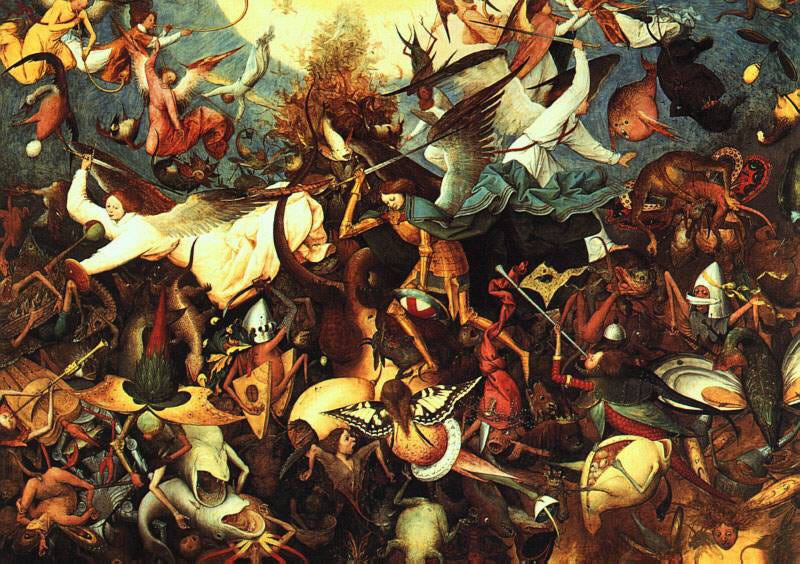
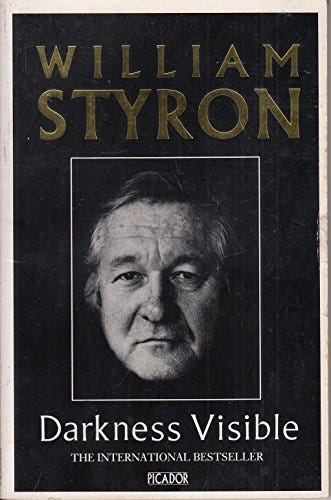

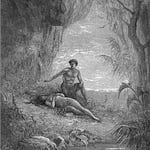
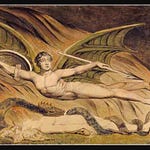

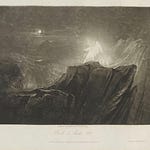
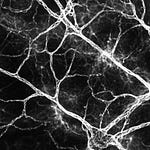
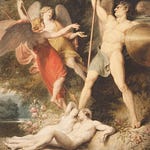


Share this post